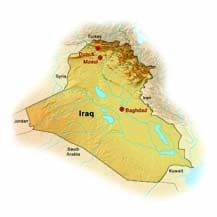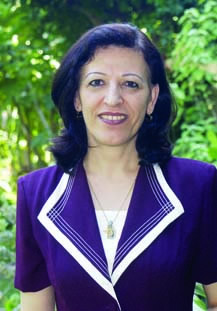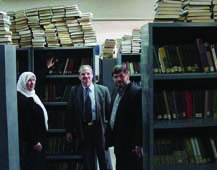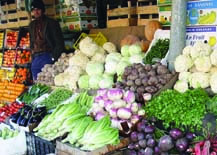Back to Iraq
A UH entomologist joins colleagues to help make her native country whole

When Ekhlass Jarjees left Iraq in 1994, the University of Mosul College of Agriculture had 11 departments, each in its own new building, and extensive experimental fields and nurseries. When she returned in 2003, the departments were crowded into a single former dormitory, the library was a pile of salvaged books, the labs lacked equipment and the faculty had fallen behind, academic victims to the effects of international sanctions, restricted travel and war.
"It is human nature to love the place you grew up," Jarjees reflects. She’s proud to be part of a project that will help the agriculture college recover its prominence in higher education.

Manoa entomologist Ekhlass Jarjees
Jarjees was born into a Mosul family that stressed higher education and family life. Among her 11 siblings are a PhD molecular biologist, three kinds of engineers, a psychologist, accountant, computer scientist and mathematician. They enjoyed a good life in Iraq, she says, but missing the eldest son, who received a post-graduate position in Australia, and facing the uncertainty of the first Gulf War, the entire family moved to Brisbane.
Last to go was Jarjees, who had earned her master’s degree looking at the impact of natural plant extracts on mosquito larvae at the University of Mosul College of Science and was working as a lecturer in the science and education colleges.
Jarjees was born into a Mosul family that stressed higher education and family life. Among her 11 siblings are a PhD molecular biologist, three kinds of engineers, a psychologist, accountant, computer scientist and mathematician. They enjoyed a good life in Iraq, she says, but missing the eldest son, who received a post-graduate position in Australia, and facing the uncertainty of the first Gulf War, the entire family moved to Brisbane.
Last to go was Jarjees, who had earned her master’s degree looking at the impact of natural plant extracts on mosquito larvae at the University of Mosul College of Science and was working as a lecturer in the science and education colleges.



Scenes from Mosul: Iraqi faculty with what’s left of the agriclture college’s library; an open market stocked by northern Iraq’s fertile farmlands; a former presidential palace that will be renovated to house the college’s learning center.
Like the rest of her family, Jarjees became a naturalized Australian citizen, and she earned a post graduate diploma of science and PhD at the University of Queensland. A postdoctoral opportunity brought her to the University of Hawaiʻi at Manoa’s College of Tropical Agriculture and Human Resources in 2001, where she continues to support herself on grants related to her research on the impacts of a protein bait on fruit flies.
A return to Iraq wasn’t in her plans. CTAHR Associate Dean Catherine Chan-Halbrendt knew about the researcher’s roots from a chance meeting at a college conversation workshop, however. When she saw the U.S. Agency for International Development call for proposals to help rebuild Iraq, Chan-Halbrendt repeatedly urged Jarjees to consider the project.
When a team eventually came together under principal investigator Samir El-Swaify, the University of Mosul was a logical choice. "It used to be one of the best agriculture colleges in the Middle East," Jarjees says. The team will also work with nearby University of Dohuk. Both universities are located in rich, fertile farmlands of northern Iraq.
The initial visit to Iraq in 2003 produced cause for optimism. The city of Dohuk is in good shape, with large, modern supermarkets. The ministry of agriculture and ministry of education are eager to collaborate through extension activities so that the universities’ work will directly benefit farmers. A presidential palace with accompanying grounds has been assigned to the Mosul College of Agriculture and Forestry, and the Coalition Provisional Authority pledged support for renovation.
On a personal level, there was the wonderful foods Jarjees missed so much and brief visits with an aunt, cousin and friends.
Unable to sell their home when they left Iraq, the Jarjees family donated it to the Sacred Heart convent across the street. The nuns, who use it for a school, offered their guest suite whenever Jarjees visits and told her they remember her father in their nightly prayers at mass. Perhaps there is karmic justice in one of Sadam’s homes now being dedicated to the Jarjees daughter’s life work. For certain, one emotion overrides the paperwork headaches and distractions from her research: "I am happy to feel I am doing something good," Jarjees says.
Team is helping rebuild Iraq’s agriculture capacity
The College of Tropical Agriculture and Human Resources faculty is helping two Iraqi universities move AHEAD (agricultural higher education and development) in rebuilding the country. Funded by the U.S. Agency for International Development, the team will work with the once-leading University of Mosul College of Agriculture and Forestry and the University of Dohuk College of Agriculture to rebuild capacity for agriculture training and research.
"With an economy dominated by oil revenues, it is often overlooked that Iraq remains predominantly an agricultural nation," says CTAHR’s Samir El-Swaify, project director and principal investigator. Revitalizing higher education in agriculture is essential to rebuilding Iraq’s food security needs, he says.
Under the $3.8 million grant, which is renewable for up to three years, the UH team will help the two Iraqi colleges form a Center of Excellence serving northern Iraq with teaching, research and extension services. "Once established, the center will serve as a catalyst to rebuild and strengthen other universities and the agriculture industry in Iraq," El-Swaify says.
Like three of his four teammates on the project, the Egyptian-born soil and water conservation expert speaks Arabic. At Manoa, he chairs the Department of Natural Resources and Environmental Management. Ali Fares is an assistant professor of watershed and soil hydrology. Entomologist Ekhlass Jarjees is from the Department of Plant and Environmental Protection Science, and Assistant Professor Sahar Zaghloul, from the Department of Human Nutrition, Animal and Food Sciences. Catherine Chan-Halbrendt, a community/resource economist, is co-director.
After an assessment visit to the region in October, El-Swaify likened current facilities to an elementary school. "It makes you cry," he told reporters. Labs are bare or equipped with obsolete computers and equipment. Books that survived lootings are piled on the floor. After 25 years of sanctions and travel restrictions, faculty are hungry for contact with other scientists in their fields.
The grant will support 12 Iraqi scholars for a semester of study at Manoa and provide graduate fellowships to Iraqi doctoral candidates who need adequate facilities to complete their research. It will help Mosul and Dohuk faculty compete for additional grants and fund professional travel to conferences. It will also equip a shared research lab and provide a satellite dish for Internet access.
Perhaps the most important provision is an electronic library containing the full text of a decade’s worth of scientific journals. (For journals published before 1993, team members are hoping retired colleagues will donate back issues. Publisher Pearson Prentice Hall has already contributed five copies each of 26 agricultural titles.)
There’s never enough money to do everything, of course, but El-Swaify is determined. "It’s going to take a little perseverance, but things will improve," he says.